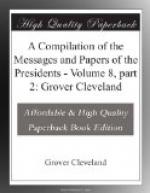TH. JEFFERSON.
PROCLAMATION.
[From the National Intelligencer, July 18, 1803.]
BY THE PRESIDENT OF THE UNITED STATES OF AMERICA.
A PROCLAMATION.
Whereas great and weighty matters claiming the consideration of the Congress of the United States form an extraordinary occasion for convening them, I do by these presents appoint Monday, the 17th day of October next, for their meeting at the city of Washington, hereby requiring their respective Senators and Representatives then and there to assemble in Congress, in order to receive such communications as may then be made to them and to consult and determine on such measures as in their wisdom may be deemed meet for the welfare of the United States.
[SEAL.]
In testimony whereof I have caused the seal of the United States to be hereunto affixed, and signed the same with my hand.
Done at the city of Washington, the 16th day of July, A.D. 1803, and in the twenty-eighth year of the Independence of the United States.
TH. JEFFERSON.
By the President:
JAMES MADISON,
Secretary.
THIRD ANNUAL MESSAGE.
OCTOBER 17, 1803.
To the Senate and House of Representatives of the United States:
In calling you together, fellow-citizens, at an earlier day than was contemplated by the act of the last session of Congress, I have not been insensible to the personal inconveniences necessarily resulting from an unexpected change in your arrangements. But matters of great public concernment have rendered this call necessary, and the interests you feel in these will supersede in your minds all private considerations.
Congress witnessed at their late session the extraordinary agitation produced in the public mind by the suspension of our right of deposit at the port of New Orleans, no assignment of another place having been made according to treaty. They were sensible that the continuance of that privation would be more injurious to our nation than any consequences which could flow from any mode of redress, but reposing just confidence in the good faith of the Government whose officer had committed the wrong, friendly and reasonable representations were resorted to, and the right of deposit was restored.
Previous, however, to this period we had not been unaware of the danger to which our peace would be perpetually exposed whilst so important a key to the commerce of the Western country remained under foreign power. Difficulties, too, were presenting themselves as to the navigation of other streams which, arising within our territories, pass through those adjacent. Propositions had therefore been authorized for obtaining on fair conditions the sovereignty of New Orleans and of other possessions in that quarter interesting




